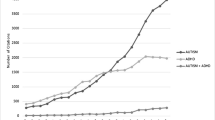Abstract
Twenty college students from a private Midwestern university were interviewed about their past and present experiences with taking medication for Attention Deficit Disorder. Analysis of respondent interviews suggested the following themes that were discussed and analyzed: recruitment of the young, little personal stigma, societal issues, side effects and abuse. Social and personal factors associated with taking medication for ADD were explored and compared with prior studies on anti-depressant medication. Practice implications were presented.
Similar content being viewed by others
References
Baumgaertel, M., Wolraich, M., & Dietrich, M. (1995). Attention deficit disorders in a German elementary school-aged sample. Journal of the American Academy of Child and Adolescent Psychiatry, 34, 629–638 doi:10.1097/00004583-199505000-00015.
Bentley, K., & Collins, K. (2006). Psychopharmacological treatment for child and adolescene mental disorders. In C. Franklin, M. Harris, & P. Allen-Meares (Eds.), The school services sourcebook: A guide for school-based professionals (pp. 15–30). New York: Oxford University Press.
Bentley, K., & Walsh, J. (2006). The social worker and psychotropic medication: Toward effective collaboration with mental health clients, families, and providers. Belmont, CA: Thomson Higher Education.
Borden, K., & Brown, R. (1989). Attributional outcomes: The subtle message of treatments for attention deficit disorder. Cognitive Therapy And Research, 13(2), 147–160 doi:10.1007/BF01173269.
Bradley, C. (1937). The behavior of children receiving Benzedrine. American Journal of Psychiatry, 94, 577–585.
Conrad, P., & Potter, D. (2000). From hyperactive children to ADD adults: Observations on the expansion of medical categories. Social Problems, 47(4), 559–582 doi:10.1525/sp.2000.47.4.03x0308v.
Conrad, P., & Schneider, J. (1980). Deviance and medicalization: From badness to sickness. Philadelphia: Temple University Press.
Davis-Berman, J., & Pestello, H. F. (2002). Psychiatric medication: Use, attitudes and effect in social work students and clinicians. Social Work in Mental Health, 1(2), 31–42 doi:10.1300/J200v01n02_03.
Davis-Berman, J., & Pestello, H. F. (2005a). The medicated self. Studies in Symbolic Interaction, 28, 283–308 doi:10.1016/S0163-2396(04)28022-X.
Davis-Berman, J., & Pestello, H. F. (2005b). Taking psychiatric medication: Listening to our clients. Social Work in Mental Health, 4(1), 17–31 doi:10.1300/J200v04n01_02.
Diagnostic and statistical manual of mental disorders. (2004). Washington, D.C.: American Psychiatric Association (APA).
Dziegielewski, S. (2006). Psychopharmacology handbook for the non-medically trained. New York: W.W. Norton.
Floersch, J. (2003). The subjective experience of youth psychotropic treatment. In K. Bentley (Ed.), Psychiatric medication issues for social workers, counselors and psychologists (pp. 51–69). New York: Haworth Press.
Foy, J., & Earls, M. (2005). A process for developing community consensus regarding the diagnosis and management of attention-deficit/hyperactivity disorder. Pediatrics, 115(1), 97–104.
Glaser, B., & Strauss, A. (1967). The discovery of grounded theory: Strategies for qualitative research. Chicago: Aldine Publishing Company.
Greenhill, L., Vitiello, B., Abikoff, H., Levine, J., March, J., Riddle, M., et al. (2001). Improving the methods for evaluating the safety of psychotropic medications in children and adolescents. Current Therapeutic Research, Clinical and Experimental, 62(12), 873–884 doi:10.1016/S0011-393X(01)80092-8.
Ialongo, N., Lopez, M., Horn, W., Pascoe, J., & Greenberg, G. (1994). Effects of psycho stimulant medication on self-perceptions of competence, control, and mood in children with attention deficit hyperactivity disorder. Journal of Clinical Child Psychology, 23(2), 161–173 doi:10.1207/s15374424jccp2302_6.
Illich, I. (1976). Medical nemesis. New York: Pantheon.
Karp, D. (1996). Speaking of sadness: Depression, disconnection, and the meanings of illness. New York: Oxford University Press.
Kelly, P., Cohen, M., Walker, W., Caskey, O., & Atkinson, A. (1989). Self-esteem in children medically managed for attention deficit disorder. Pediatrics, 83, 211–217.
Kendall, J., Hatton, D., Beckett, A., & Leo, M. (2003). Children’s accounts of attention-deficit/hyperactivity disorder. ANS Advances in Nursing Science, 26(2), 114–130.
Knipp, D. (2006). Teens’ perceptions about attention deficit/hyperactivity disorder and medications. Journal of School Nursing, 22(2), 120–125. doi:10.1622/1059-8405(2006)022[0120:TPAAHD]2.0.CO;2.
Miller, L. (2000). Kids on drugs, March 9, 2000. www.salon.com/health
Moynihan, R., & Cassels, A. (2005). Selling sickness: How the world’s pharmaceutical companies are turning us all into patients. New York: Nation Books.
Murray, M., deVries, C., & Wong, I. (2004). A drug utilization study of antidepressants in children and adolescents using the General Practice Research Database. Archives of Disease in Childhood, 89, 1098–1102 doi:10.1136/adc.2004.064956.
Payer, L. (1992). Disease mongers: How doctors, drug companies, and insurers are making you feel sick. New York: John Wiley & Sons.
Pope, C., Ziebland, S., & Mays, N. (2000). Qualitative research in health care: Analysing qualitative data. British Medical Journal, 320, 114–116 doi:10.1136/bmj.320.7227.114.
Searight, H., & McLaren, A. (1998). Attention-deficit disorder: The medicalization of misbehavior. Journal of Clinical Psychology in Medical Settings, 5(4), 467–495 doi:10.1023/A:1026263012665.
Acknowledgement
The authors would like to thank Brianna Remster for her work in transcribing the interviews for this study. Her efforts were invaluable.
Author information
Authors and Affiliations
Corresponding author
Rights and permissions
About this article
Cite this article
Davis-Berman, J.L., Pestello, F.G. Medicating for ADD/ADHD: Personal and Social Issues. Int J Ment Health Addiction 8, 482–492 (2010). https://doi.org/10.1007/s11469-008-9167-z
Received:
Accepted:
Published:
Issue Date:
DOI: https://doi.org/10.1007/s11469-008-9167-z




